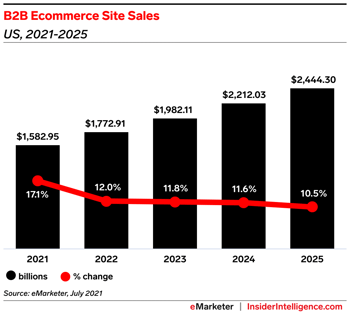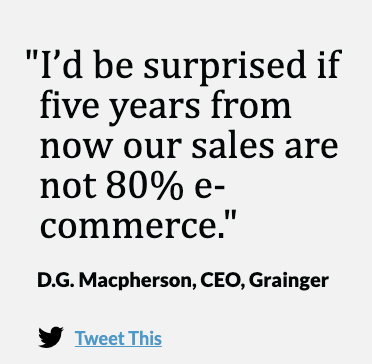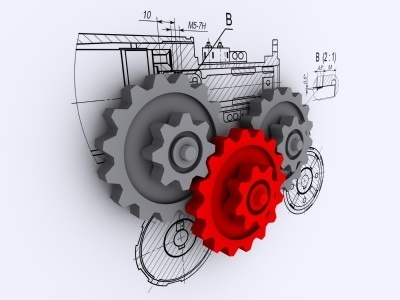Tl;dr - B2B ecommerce is as prevalent as B2C, as measured by percentage of each sector's total commerce. Yet many middle market industrial manufacturing firms hesitate to implement an industrial ecommerce program. That's a strategic blunder.
It's Not a B2B or B2C Decision
 Ecommerce developed as a B2C phenomenon in the middle of most senior industrial executives' professional careers.
Ecommerce developed as a B2C phenomenon in the middle of most senior industrial executives' professional careers.
But that's only where it started. If we were to use a common contemporary meme theme - "how it started" and "how it's going" - the results might be surprising.
Approximately 14% of all retail sales were made via ecommerce in 2020.1 And....wait for it....approximately 17% of 2023 B2B purchasing is projected to occur via ecommerce.2
The time frames are offset a bit, but the point is that the numbers are similar. B2B ecommerce is significant. Buyers have driven the growth, and business leaders with foresight have enabled it.
 In 2017 the W.W. Grainger Co. CEO, DG Macpherson, predicted that within 5 years 80% of their sales would be conducted via ecommerce.3 In fact, "in 2021, more than 75% of the distributor’s $13 billion in total sales were digital."4
In 2017 the W.W. Grainger Co. CEO, DG Macpherson, predicted that within 5 years 80% of their sales would be conducted via ecommerce.3 In fact, "in 2021, more than 75% of the distributor’s $13 billion in total sales were digital."4
Grainger is an important success story, but it's not alone.
"Forrester estimates that by 2027, US B2B e-commerce will reach $3 trillion and account for 24% of total US B2B sales. At the end of 2021, B2B e-commerce reached $1.7 trillion, representing 16% of total B2B sales in the US."5
I'm guessing that many of you reading this will think "I understand Grainger, but they're a big company with limitless resources. We're a small business, and anyway, we're not selling MRO and facilities supplies. We sell complex engineered solutions. That's different." OK. That's a valid argument. Except it doesn't change the situation!
Recent McKinsey research found that "Seventy-one percent of buyers are willing to spend more than $50,000 in a single transaction, and 27 percent would spend $500,000 or more"6 in a single "remote or self-service (e.g. digital/ecommerce) transaction."
They went on to identify 5 prevalent B2B ecommerce myths7 which include:
- Myth: Most companies don't offer ecommerce - actually 65% do
- Myth: Buyers prefer face-to-face interactions - ecommerce has passed in person as the most effective sales channel
- Myth: Just a basic ecommerce site can suffice - leading companies treat it as a full-service channel
- Myth: Ecommerce is only for repeat or low-ticket purchases - "15% of corporate decision makers are comfortable making purchases worth more than $1 million online"
- Myth: Digital marketplaces are a next-level "nice to have" - 60% of buyers say they want them
In other words, it's not some fringe activity. It's a buyer expectation that's becoming more ossified as our consumer experiences make online purchases ubiquitous and richly featured.
Middle Market companies who compete against large established brands for machine sales based on their prowess and expertise can't then claim a small biz exemption for these important and expected capabilities.
Yes, it will require resources. Yes, it may highlight shortcomings in a casual approach to ERP implementation. And yes, many in your company will declare it a boondoggle.
Except buyers expect industrial ecommerce and companies must therefore embrace it.
Barriers to Implementing Industrial Ecommerce
 We can be realistic here. This isn't an easy transition for most middle-market capital equipment manufacturers to consider - much less implement.
We can be realistic here. This isn't an easy transition for most middle-market capital equipment manufacturers to consider - much less implement.
Boards of Directors, owner, senior executive management, and sales mindsets will have to evolve. "Our buyers" and "our industry are different" excuses must be called out.
Sales teams particularly will object. Depending on how sales are tracked and commissions are paid, they'll resent a new and large potential "competitor." Indirect sales channel will also react strongly.
Many manufacturers use ERPs, but only partially (e.g. to build a BOM but not to track all inventory levels), and often unusual ERP platforms and/or outrageously customized implementations make supporting integrations cumbersome. Others use ERP for new machine build, but not for order processing or for aftermarket sales. So integrations between ERP and an ecommerce solution to track inventory levels and trigger transactions may be difficult.icult.
An Ecommerce Website can Increase Customer Satisfaction for Manufacturing Businesses
 Companies support machines for years. With upgrades, rebuilds and vibrant secondary markets, that often includes machines that are 10, 20 or even >25 years old. Parts lists are often incomplete. Many parts are no longer available. Explosion drawings may be digitized as .pdfs, but not workable files. And of course, these "one-off" requests are where the team spends most of their time...and therefore what they think of when discussions of standardization arise.
Companies support machines for years. With upgrades, rebuilds and vibrant secondary markets, that often includes machines that are 10, 20 or even >25 years old. Parts lists are often incomplete. Many parts are no longer available. Explosion drawings may be digitized as .pdfs, but not workable files. And of course, these "one-off" requests are where the team spends most of their time...and therefore what they think of when discussions of standardization arise.
Finally, real and practical resource limitations will impede progress. Ecommerce platforms cost money - to operate and implement. Aftermarket teams will feel overwhelmed. IT may not understand the buyer expectations imperative and will focus on technicalities (their job, but an impediment to success.) Marketing will have a powerful set of new tools - but probably not the in-house skills to leverage them. And fraught executives will have to invest time in change management.
None of those preclude success however. Like so much, it's a matter of prioritization. Looking internally, it feels like a low-priority task compared to the established efforts.
That's why it's imperative that the prospect/buyer/customer perspective be continuously promoted to clarify why the effort is not optional, and to guide the implementation toward success vs. simple completion.
Off-the-Shelf Industrial Ecommerce Solutions and Intermediate Progress
 The good news is that industrial ecommerce isn't experimental as the statistics above attest. Many vendors provide a mature, well-documented and supported, ready-made industrial e-commerce platform solutionswith vibrant partner communities.
The good news is that industrial ecommerce isn't experimental as the statistics above attest. Many vendors provide a mature, well-documented and supported, ready-made industrial e-commerce platform solutionswith vibrant partner communities.
It's easy to find two to three strong solutions for every ERP and CMS (content management system - your website software) combination. And often there are experienced partners who have worked with companies like yours on virtually identical implementations.
Companies needn't implement a comprehensive solution to start (to contradict McKinsey's "myths" above.) Every company has common PM, wear item, and "break-fix" parts. The 80/20 rule always applies. And creating an industrial ecommerce capability for those 20% of parts is substantially simpler than accommodating every unique, custom and legacy part.
It's also reasonable to begin to ease into this digital commerce transformation with some intermediate steps that will use digital capabilities to improve the prospect, buyer and customer experience before jumping into online marketplaces for industrial products.
E Commerce Sales of MRO Spares Is Just One of the Industrial Products Digital Sales Tools Available
A great example is to create a customer portal building on machine data via a CRM custom object. This provides an easy way to dynamically deliver support and maintenance information to customers - short of an industrial ecommerce platform. Digital marketing tactics, and tools like email marketing software, will help alert industrial buyers and existing customers to the new capabilities.
The portal can provide registered users with various info and tools including explosion drawings, training videos, manuals, spare parts lists and even "ticketing" tools and other automation that can be used to trigger simple orders (e.g. a form that can be completed in the portal with check boxes for common wear items, a field for PO# and other details.)
It's obviously not a full e commerce solution, but it can achieve the important goal of making transactions and the ongoing support relationship easier for your customers while it gradually eases your team into a digital buyer experience mindset.
Culture, Resistance and the Strategy Payoff
 Many people on your team will push back against both the concept and implementation details of industrial ecommerce. That doesn't mean it's actually wrong or inappropriate for your business.
Many people on your team will push back against both the concept and implementation details of industrial ecommerce. That doesn't mean it's actually wrong or inappropriate for your business.
The change will be unwelcome and uncomfortable for many. And there will doubtless be moments when implementation hiccups. Those who oppose the initiative will vocally seize on those moments to proclaim the folly of your decision.
All that's OK. It's part of what you signed up for as management, and like so many management challenges it's about communicating the change and underlying reasons with consistent clarity.
What are those underlying reasons?
Industrial Companies Can Improve the Customer Journey & Create Competitive Advantage
Ultimately it may help drive down some operational and support costs. But that's not the reason - after all it will increase them at least in the short term.
The real reason is to create a better experience for buyers. McKinsey's research findings are clear. That's what buyers want. It must be a pillar of your strategy.
Undertaking an initiative which you can tie directly back to meeting buyer expectations and improving the customer experience - despite creating friction and discomfort internally - demonstrates clearly that you're leading the company with a strategic focus on solving for the buyer.
E Commerce Can be a Strategic Differentiator for Industrial Companies
That is perhaps the most important strategic imperative, in parallel with a similarly inspired product roadmap, for any capital equipment company today.
Implementing online sales as part of an industrial ecommerce program will improve buyer experience and signal to your company that you will undertake challenging and uncomfortable change to "walk the talk" of your B2B strategy.
1. % of retail sales via ecommerce via Statista
2. % of B2B purchasing via ecommerce via Statista
3. DigitalCommerce 360 W.W. Grainger ecommerce predictions
4. Grainger digital sales results 2021
5. Forrester B2B ecommerce forecast 2022-2027


